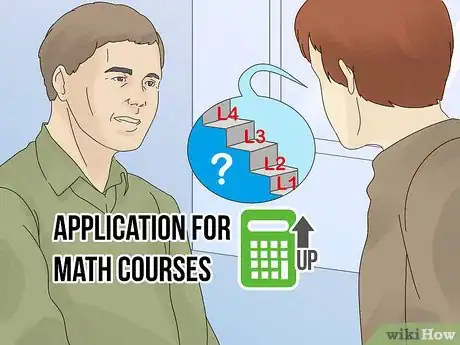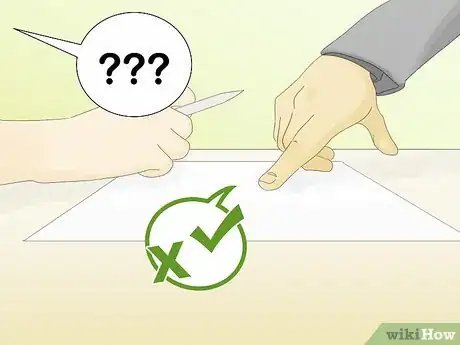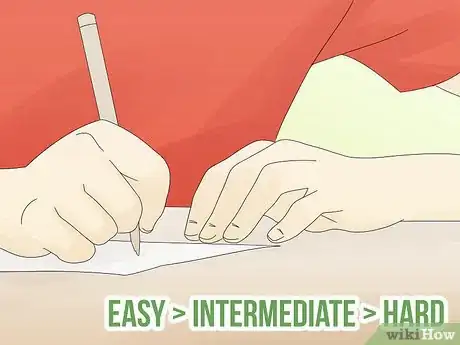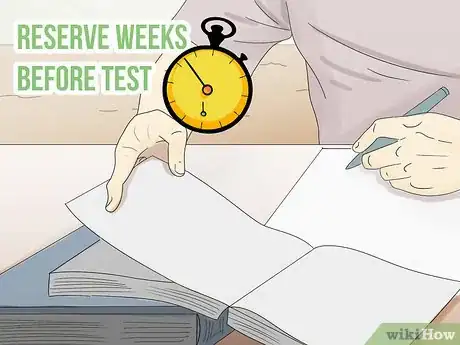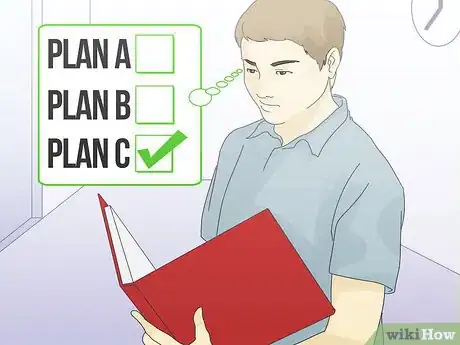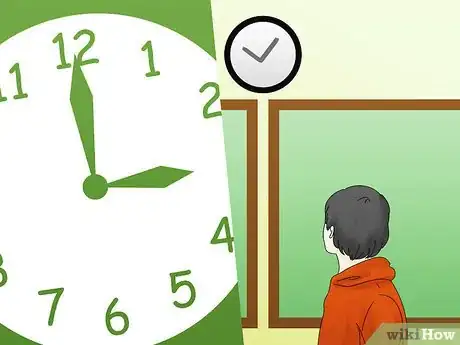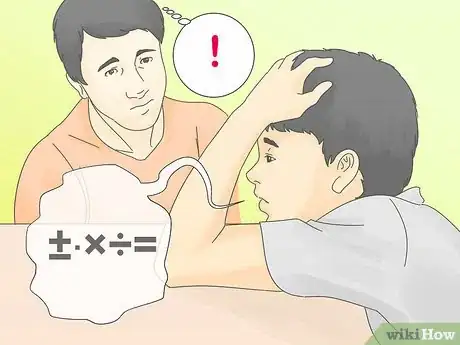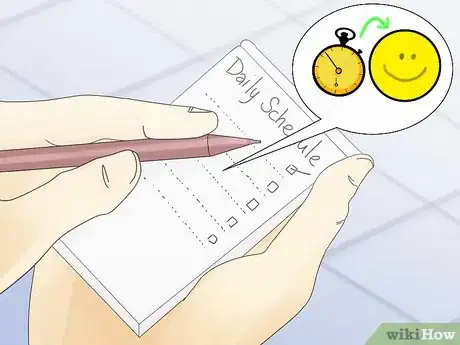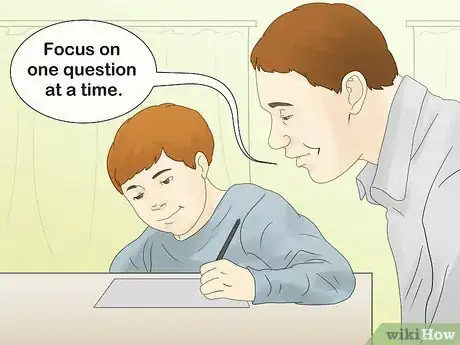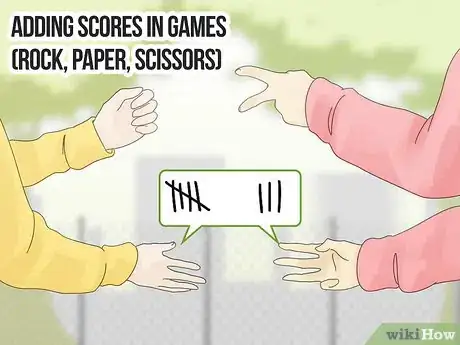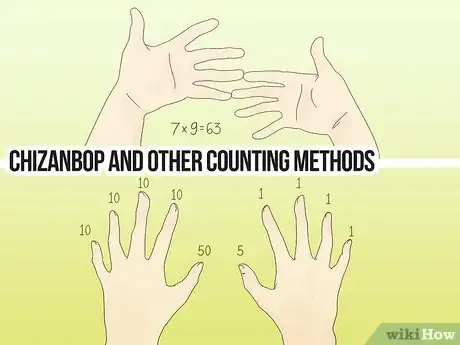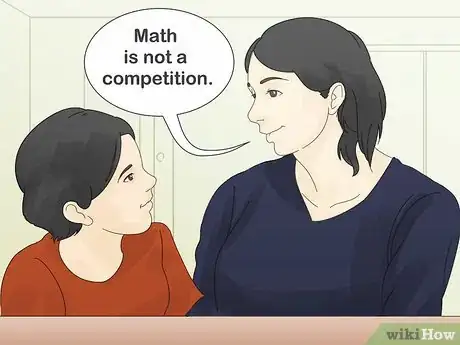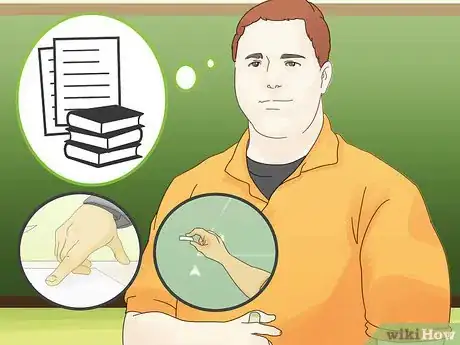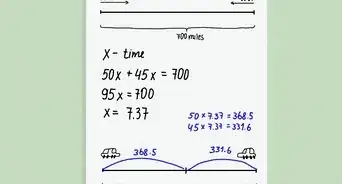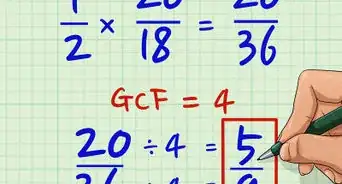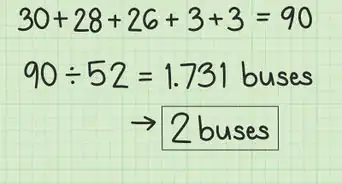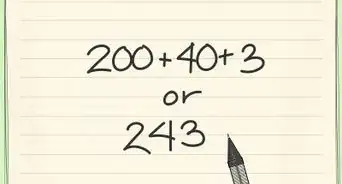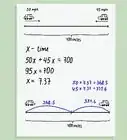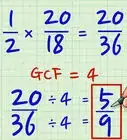This article was co-authored by Soren Rosier, PhD. Soren Rosier is a PhD candidate at Stanford's Graduate School of Education. He studies how children teach each other and how to train effective peer teachers. Before beginning his PhD, he was a middle school teacher in Oakland, California, and a researcher at SRI International. He received his undergraduate degree from Harvard University in 2010.
There are 8 references cited in this article, which can be found at the bottom of the page.
wikiHow marks an article as reader-approved once it receives enough positive feedback. In this case, 84% of readers who voted found the article helpful, earning it our reader-approved status.
This article has been viewed 88,912 times.
Mathematics has been the foundation of many of our scientific and technological discoveries. However, to many children and adults, "math" is a 4-letter word that evokes emotions ranging from dislike and anxiety to outright fear. Math anxiety, and its more severe form, math phobia, has kept many students from studying more challenging disciplines where mathematics plays an integral role. If you or your child are among those who are afraid of math, read the following steps on how to cope with math phobia and perhaps find a way to view math in a more positive light.
Steps
Conquering Your Own Math Phobia
-
1Recognize the symptoms of math phobia. If you get anxious or frustrated when dealing with math and numbers you may have math phobia or anxiety. There are four common symptoms that can help you recognize if this is the case for you: panic, paranoia, passive behavior and lack of confidence.[1] Ask yourself some of the following questions to see if you might have math phobia:
- Panic: Do you feel a wave of helplessness or terror associated with math class, tests, quizzes, and homework?
- Paranoia: Are you concerned that you are the only person in the world who can't do the math problems and that everyone else is smarter than you?
- Passive behavior: Have you given up on trying to learn and understand math entirely because you feel that you are just not smart enough?
- Lack of confidence: Do you second guess all of your answers and rely on others to help you through the material?
-
2Acknowledge your math anxiety. As with most phobias and addictions, the first step to treatment is admitting the problem. Having math phobia in itself does not make you a bad person, but not dealing with it will affect your life negatively.[2]
- This is especially important if you have a child who is struggling with math. Your own anxiety can increase theirs.
Advertisement -
3Sign-up for the proper level of math course. Everyone has different abilities and learns at a different pace. Make sure that you are placed in the proper level of mathematics before you begin. Being placed in a course that is more advanced than you are can be extremely frustrating as you struggle to keep up with the material.
- Talk to your advisors and discuss what level of math they think is appropriate for your skill level.
- Take a math placement test to help you gauge your level of knowledge.
-
4Choose a professor who fits your learning style. At the high school level or below, this may not be an option, but at the college level you can choose your professor and math section. There are many online sites where previous students have rated a professor that will allow you to get an idea of their teaching style.
- Ask other students who have been in that professor's class about how they liked it.
- Schedule a meeting with the professor and ask them specifically about how they teach. Tell them about your learning style and discuss whether you think they'd be a good fit for you.
-
5Ask questions when you don't understand. Math concepts build upon each other and if you get lost in the beginning, it will be much harder to understand later concepts. Good teachers want their students to succeed; they won't necessarily know your underlying problem if you don't let them know.
- Try not to feel embarrassed about asking a question. If you don't understand something, it's likely that there is at least one other person in the room who is also confused.
-
6Work the easiest problems first. In most groups of problems assigned as homework, the easiest problems come first and progress in difficulty toward the end. Answer the easier problems first and then work your way through the more difficult ones.[3] Take your time and skip over a problem when you get stuck. You can always go back to it later.
- This strategy works well for quizzes and tests as well. Don't forget to go back to the questions you skipped along the way!
-
7Give yourself plenty of time to study for a test. Instead of cramming for a test the night before, set aside time each day to study and do practice problems. This will decrease your anxiety about having enough time to learn everything you need to know.[4]
- Repeated long-term practice will help you remember how to solve things when stressed in the testing environment.
- Studying early also gives you time to focus on the concepts that are more difficult to master.
-
8Make a test plan to lower your anxiety. Other than possibly varying the level of difficulty back and forth, the only difference between a test and homework is that you have a more limited amount of time to complete a test in. You can ease your anxiety about a math test if you approach it with a positive attitude and a plan of attack.[5]
- Put the test's importance in its proper perspective. The test is only to measure how well you've learned the material in the unit it covers, not about your overall worth as a student or as a person.
- Use your limited time wisely. Don't dawdle, but don't rush, either. Take enough time to read a question over to understand it. Knock out the easiest questions first, and use the remaining time to work through the more difficult questions.
- Show your work; you're not just being tested on getting the right answer but on your understanding of the method used to get the right answer.
-
9Ask for extended time. Talk to your teacher and ask them about options for getting extended time for taking quizzes and exams. Having extra time to get through the test can help ease your anxiety about getting to every question in the allotted time.
- You may need to speak to a counselor or take a diagnostic test to qualify for extended time.
-
10Revise your study habits. While believing you can't do math has probably affected the way you study it, changing the way you study math may change your attitude about it. Simply memorizing a formula is not as effective as understanding what the formula means and knowing exactly when to use it. Try some of the methods listed below:[6]
- Read the textbook as thoroughly as you can. You may need to read the lesson over several times if some of the passages are difficult or information-dense, but allow yourself time to absorb the text as best you can. Write down questions as you read to ask about in class later.
- Learn to be discerning in taking lecture notes. Your goal is to understand the lecture, not to scribble notes for the sake of scribbling notes. Take the time to evaluate the lecture for what's important and write that down, then write down the supporting material.
- Try studying in groups. Working with a study group can sometimes help you understand the subject better than doing everything alone. One of your classmates who "gets it" may be able to explain it to you in a way you can understand.
Helping Your Child Conquer Math Phobia
-
1Recognize the signs of math phobia in your child. If your child seems completely disinterested or even scared to do their math homework, they may have anxiety towards the subject. Your child may say something like “I'll never be good at math” and assume that they just don't have the intelligence for the subject.[7]
- Pay attention to your child's behavior and see if they get upset specifically when they have to do math or if there is some other reason for their behavior that day.
-
2Reinforce your child's sense of intelligence and skill. Positive reinforcement is a great way to help your child overcome math phobia. Instead of being negative when they get something wrong, talk through the problems with them and emphasize the aspects that they got correct. Point out the skills that they have mastered and stay positive about the ones that still need some work.[8]
- Hire a tutor so they can get one-on-one help in a positive, confidence-building learning environment.
-
3Create a supportive environment for learning math. Talk about math in a positive way. If your child gets an answer wrong, have them look at the problem again, without berating them for the mistake. There are several ways you can foster a positive learning environment for studying mathematics, or any other subject, for that matter:[9]
- Remind your child that math skills aren't learned automatically and that everyone learns at a different rate.
- Let your child set up a study environment that suits them, within reason. While you may not want to allow visual distractions such as the TV or internet, your child may prefer background music, or to study on the floor supported by pillows instead of sitting at a desk.
- Allow calculators and computers for doing the actual calculations, but encourage your child to learn to set up the problem without assistance.
-
4Schedule study breaks. If your child is having trouble with math, working longer at it usually won't solve the problem. Extended study without a break can lead to frustration. Take a short break to let your child process the information and avoid prolonged frustration.[10]
- Taking a step back to find out what the problem is and developing an alternate approach is a better way for your child to learn and understand.
-
5Encourage your child to tackle math one problem at a time. It is very easy to become overwhelmed when presented with a problem set or test with 30 questions in it. You never sit down and try to read a whole book all at once, so why would you try to do that with math? Encourage your child to focus on one question at a time.
- If they come across a problem that is particularly difficult, tell them to skip it and come back to it later. Answering the easier questions will build their confidence for when they get to the harder ones.
-
6Show your child the positive uses of math. Mathematics plays a role in many aspects of life, such as cooking (ratios and proportions), sports (scorekeeping), home upkeep (calculating quantities of building materials and paint, budgeting), and others. Showing the practical uses of math may motivate your child to learn math instead of fear it.[11]
- Try to turn math problems into games while doing daily household activities.
-
7Get to know your child's teacher and their teaching methods. To help a child struggling with math, you need to know how it's being taught in his or her classroom. It may be that your child needs more attention than is possible in the classroom, or your child may learn math better if taught it a different way.[12]
- Discuss the matter with your child's teacher, who can help you plan a suitable way to supplement your child's education.
- Your child may think about problems differently than you do. Encourage them to solve problems in the way that makes the most sense to them.
-
8Familiarize yourself with math teaching aids. In addition to the calculator and computer, there are a number of math teaching aids to assist in performing basic calculations, including finger calculation methods such as Chizanbop and devices such as Cuisenaire rods, Dienes blocks, and Napier's rods. You can learn about these and other methods from the website of the National Council of Teachers of Mathematics (NCTM) and other sources.
- The NCTM website features a section devoted to helping parents and other family members help their children learn math, including an overview of how math is currently taught.[13]
-
9Support the positive aspects of math with games, puzzles, and humor. Coupled with math anxiety is the belief that math is not a "fun" subject. In fact, math can be fun if approached the right way.
- Games such as Battleship and mancala teach logical thinking skills, while games such as Yahtzee teach number recognition, probability, and strategy.[14] There are also a number of educational games available through the NCTM website.[15]
- Puzzles such as magic squares teach pattern recognition and logical thinking while reinforcing calculation skills, and also show some of the interesting relationships between numbers in our mathematical system.
- Math humor helps students take themselves less seriously while taking math itself seriously. Math humor can come in the form of cartoons, jokes (such as the number 7 being cannibalistic because "7 ate 9"), or even song parody (such as the original author of this article parodying the Five Man Electric Band's song "Signs" as "Sines," about the difficulties of learning trigonometry).
EXPERT TIP"Math games can help kids enjoy math and help them feel like they're learning, which may increase their interest in the subject."
Soren Rosier is a PhD candidate at Stanford's Graduate School of Education. He studies how children teach each other and how to train effective peer teachers. Before beginning his PhD, he was a middle school teacher in Oakland, California, and a researcher at SRI International. He received his undergraduate degree from Harvard University in 2010.
Soren Rosier, PhD
PhD in Education Candidate, Stanford University Soren Rosier, PhD
Soren Rosier, PhD
PhD in Education Candidate, Stanford University -
10Encourage your child to not compare their abilities to their classmates. Your child may have a tendency to come home and complain that they just aren't as good at math as one of their classmates. Try to discourage this type of talk and let them know that they just learn at a different pace. Math is not a competition.
- Avoid making statements around your child that may give them the impression that you are comparing them to their own classmates or siblings.
Understanding Math Phobia
-
1Know the myths about mathematical ability. Some people develop a fear of mathematics because they believe things about math that aren't necessarily true. Statements like, “men are better at math than women” or “there is no creativity involved in math” are just a few myths that are commonly heard and believed.
- While there have historically been more male mathematicians than female mathematicians, no evidence exists to show that men are innately better at math than women. Historically, men have had better educational opportunities than women, but this is changing.
- Some believe that math is all about logic, with little to do with creativity. Although logical thinking is necessary to work through the steps to solve a math problem, understanding where to begin in solving the problem sometimes requires a healthy dose of intuition.
- Some believe that to be good in math means being able to do all the calculations in your head. Counting on the fingers shows an understanding of basic arithmetic, and a form of finger calculation led to the development of the abacus.
- Some believe that being good in math means getting the right answer in the right way. While the ways taught to do certain calculations are the easiest and "best" methods, they're not the only methods. When adding 1/6 to 3/8, it's usually taught to convert to the equivalent fractions of 4/24 and 9/24 to add to make 13/24 because 24 is the lowest common multiple of 6 and 8. However, it's also okay to convert the fractions to 8/48 and 18/48 (6 x 8 = 48) and add to make 26/48, which reduces to 13/24. Finding the lowest common multiple simply means you have smaller numerators to add together.
-
2Recognize perfectionist thinking. Related to the common myths about mathematical ability listed above are personal beliefs about one's inability to do math. People with math phobias may believe they can't get the answer fast enough, or that if they got the answer, the problem had to have been too easy. In truth, while a math test may be timed, mathematics is not about how fast you get the answer.
- If the problem looked too simple, it's more likely that you are actually better at math than you think you are.
- When approaching math, take your time and take perfection out of it. Tell yourself that nobody is perfect and if you struggle with a problem, ask questions instead of giving up.[16]
-
3Consider the ability of the teacher who taught you or your child. Unfortunately, many teachers themselves suffer from math anxiety and accordingly do not teach math well. Such teachers usually fall back to teaching exclusively from the textbook, relying on memorizing facts, and employing only drill and practice to reinforce the lesson.
- Note that while many college education programs require future teachers to declare and be educated in an academic specialization or concentration, school districts may hire teachers for teaching positions outside that area of specialization. Thus, a teacher hired to teach mathematics may not have had a great deal of academic coursework in the subject and how to teach it.
-
4Consider your own feelings about mathematics. If you yourself suffer from math anxiety, you'll more than likely pass your fears onto your children if you don't address them. Although telling your child that it's okay not to be good at math because you weren't on the surface sounds supportive, it also lowers their expectations for themselves.[17]
- Cultivate a positive environment relating to mathematics, especially when helping your children with their assignments.
Community Q&A
-
QuestionWhat do I do when my teacher teaches too fast? I'm in my first year of college, and my teacher gets annoyed with us when we ask him to slow down. I'm afraid of failing the class!
 DonaganTop AnswererIf other students are struggling too, you might form a study group with them, and figure out together what your teacher is saying. You could go as a group to him/her and ask for help.
DonaganTop AnswererIf other students are struggling too, you might form a study group with them, and figure out together what your teacher is saying. You could go as a group to him/her and ask for help. -
QuestionI feel embarrassing while asking a question, I worry about what my classmates might think? Please give me some tips to solve my problem.
 DonaganTop AnswererSome of your classmates are probably thinking, "I wish I had the courage to ask that question." Others are probably thinking, "That's a good question." Some may be thinking, "I like what he/she is wearing." Others aren't even listening. Yes, some may be thinking, "That was a stupid question." You'll never be able to please everyone. Just work hard at understanding math concepts, and keep your priorities in mind: Do you want good grades, or do you want to please everyone?
DonaganTop AnswererSome of your classmates are probably thinking, "I wish I had the courage to ask that question." Others are probably thinking, "That's a good question." Some may be thinking, "I like what he/she is wearing." Others aren't even listening. Yes, some may be thinking, "That was a stupid question." You'll never be able to please everyone. Just work hard at understanding math concepts, and keep your priorities in mind: Do you want good grades, or do you want to please everyone? -
QuestionIf I'm making a schedule for studying math, should I write it down like, "Study math for 2 hours" or "Study for math between 2:00-4:00"?
 DonaganTop AnswererThe latter method is probably better unless you're really busy, in which case you may need to work it in whenever possible.
DonaganTop AnswererThe latter method is probably better unless you're really busy, in which case you may need to work it in whenever possible.
References
- ↑ http://mathandreadinghelp.org/articles/Symptoms_and_causes_of_math_anxiety.html
- ↑ http://www.crosswalk.com/family/homeschool/how-to-deal-with-math-anxiety-1402757.html
- ↑ http://www.weber.edu/wsuimages/vetsupwardbound/StudySkills/overcomemathanxiety.pdf
- ↑ http://www.weber.edu/wsuimages/vetsupwardbound/StudySkills/overcomemathanxiety.pdf
- ↑ http://www.weber.edu/wsuimages/vetsupwardbound/StudySkills/overcomemathanxiety.pdf
- ↑ http://www.weber.edu/wsuimages/vetsupwardbound/StudySkills/overcomemathanxiety.pdf
- ↑ http://mathandreadinghelp.org/articles/Symptoms_and_causes_of_math_anxiety.html
- ↑ http://mathandreadinghelp.org/articles/Symptoms_and_causes_of_math_anxiety.html
- ↑ http://www.crosswalk.com/family/homeschool/how-to-deal-with-math-anxiety-1402757.html
- ↑ http://www.crosswalk.com/family/homeschool/how-to-deal-with-math-anxiety-1402757.html
- ↑ http://www.crosswalk.com/family/homeschool/how-to-deal-with-math-anxiety-1402757.html
- ↑ http://www.crosswalk.com/family/homeschool/how-to-deal-with-math-anxiety-1402757.html
- ↑ http://www.nctm.org/ccssm/
- ↑ http://www.unlocktheeinsteininside.com/ProgramReview_GamesForSkills.pdf
- ↑ http://illuminations.nctm.org/Games-Puzzles.aspx
- ↑ https://www.anxietybc.com/sites/default/files/Perfectionism.pdf
- ↑ http://mathfour.com/math-anxiety
About This Article
If you’re concerned that you might have a math phobia, think about whether you feel panicked or anxious when you have to deal with math. If that’s the case, admit that you have a phobia without judging or criticizing yourself for it. To help manage your anxiety, work with your teacher or academic advisor to make sure you are taking math classes at an appropriate level for you. Additionally, if you’re able to choose your math teachers, ask other students and faculty about their teaching methods and pick someone you think will fit your learning style. Keep reading to learn how to help a child with a math phobia!


